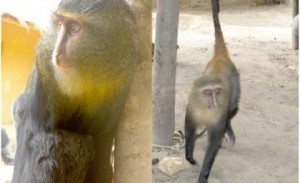Congo-Kinshasa: New Monkey Species Identified in DRC
 In June 2007, a previously undocumented monkey known locally as “Lesula” was found in the forests of the middle Lomami Basin in central Democratic Republic of Congo. This new species is described as Cercopithecus lomamiensis. (PHOTO ESSAY: New Monkey Species Identified in DR Congo)
In June 2007, a previously undocumented monkey known locally as “Lesula” was found in the forests of the middle Lomami Basin in central Democratic Republic of Congo. This new species is described as Cercopithecus lomamiensis. (PHOTO ESSAY: New Monkey Species Identified in DR Congo)
Cape Town — Scientific journal Plos One has published a paper in which scientists describe a new species of monkey they found living in the remote forests of the Democratic Republic of Congo. The new species, called Cercopithecus Lomamiensis, was known to local hunters and is called the Lesula.
The discovery – deep in central Congo’s Lomami forest basin – is the first of its kind in 28 years and has caused waves in an age where much of the Earth has been photographed and digitized.
The lead scientist of the project, John Hart, said there was a rigorous scientific process of three years to determine that the Lesula was a new species.
“This was a totally unexpected find, and we knew we had something unusual and possibly unknown when we first saw the animal. But it was not until we had the genetic and morphological analyses of our collaborating team that we knew we really had a new species,” Terese and John Hart, conservation biologists with the Lukuru Wildlife Research Foundation, told OurAmazingPlanet.com.
The team came across the new monkey in June 2007 when field teams saw a female monkey of an unknown species – with large eyes, a pink face, yellow mane, and blue bottom – at the home of the primary school director in the town of Opala.
The find represents a rare discovery of a previously undocumented mammal, and helps establish this sparsely settled region of the Democratic Republic of Congo as an important source of biodiversity, researchers say.
Hart told Global Animal that he hopes the discovery will “reignite Congolese efforts in forest conservation”, and that his foundation is
working with authorities to create a national park in order to preserve the Lomami basin’s biodiversity. – allAfrica.com









